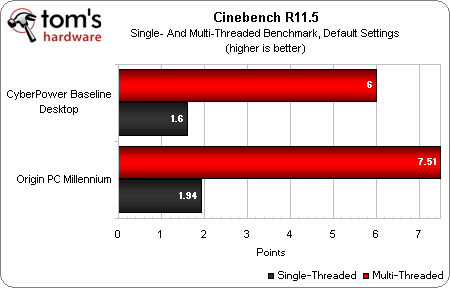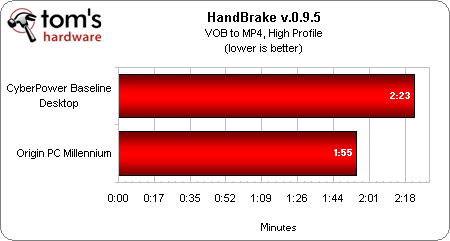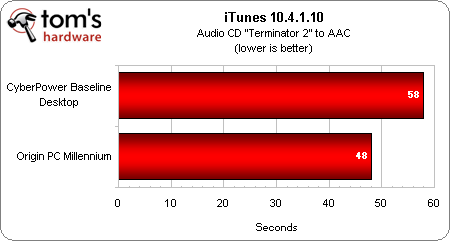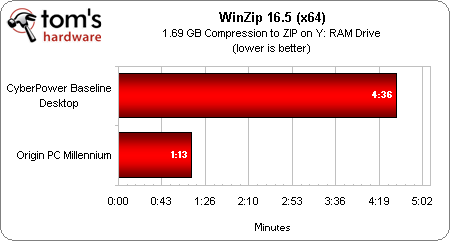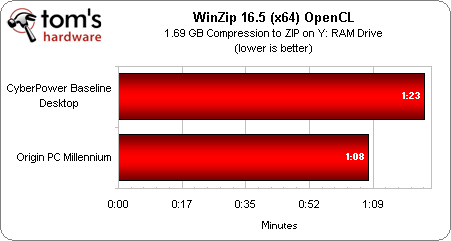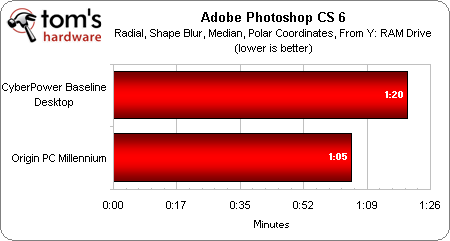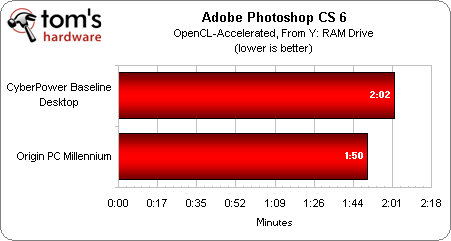Origin PC Millennium: 3-Way SLI And A 4.6 GHz Core i5
After a long hiatus, Tom's Hardware returns to consumer desktop reviews with Origin PC's Millennium. Can three GeForce GTX 660 Ti cards and an overclocked Core i5 handle gaming at 5760x1080? We want to know if this elegant box is worth its $3,000+ price.
Benchmark Results: CPU And Multimedia
While both the Millennium and our CyberPower LAN Party Evo baseline system share the same CPU (a relatively modest quad-core Intel Core i5-3570K), performance on CPU-centric tests is far from equal. CyberPower, perhaps constrained by the thermal issues that come with a compact case, leaves the chip at a stock 3.4 GHz base frequency able to reach up to 3.8 GHz in light workloads via Turbo Boost.
Meanwhile, Origin takes advantage of the Millennium's larger case and its own branded Frostbyte 120 closed-loop liquid cooler, pushing the Core i5-3570K to an impressive 4.6 GHz. This yields an appreciable performance edge in both single- and multi-threaded tasks. The difference is on stark display in Cinebench, yet it manifests noticeably in more real-world tests as well.
Many of these tests are designed to measure CPU performance for processor testing, so the software is offloaded onto a RAM drive, ensuring that drive performance doesn't impact the results. However, most users are likely going to keep their software on the boot drives, and the Millennium’s dual SSDs in RAID 0 give it a distinct advantage there. We’ll delve deeper into that subsystem once we get to drive testing.
However, we know from quite a bit of follow-up testing after this quarter's System Builder Marathon that the RAM drive doesn't actually affect performance that much. Running these benchmarks from an SSD, or even a hard drive, returns similar numbers. So, while the Millennium's two SSDs in RAID 0 are going to really help it with boot times and app loading, don't expect processor-dependent workloads to realize much benefit from them.
With its overclocked CPU, the Millennium’s productivity and media-crunching performance is very impressive. It holds a strong lead over CyberPower's baseline system with the same CPU, sans overclock. In many ways, the Millennium's overclocked Core i5 would likely stack up well against pricier i7 processors at stock settings.
Sure, if you’re a professional content-creator who frequently waits around for media to render, using software that takes advantage of all available cores and threads, you may want to step up to a Sandy Bridge-E-based system. But given the price difference, we maintain that Intel's Core i5-3570K and Core i7-3770K are far smarter options for even demanding gamers.
Get Tom's Hardware's best news and in-depth reviews, straight to your inbox.
Current page: Benchmark Results: CPU And Multimedia
Prev Page CyberPower Baseline System And Benchmarks Next Page Benchmark Results: GamingAfter a rough start with the Mattel Aquarius as a child, Matt built his first PC in the late 1990s and ventured into mild PC modding in the early 2000s. He’s spent the last 15 years covering emerging technology for Smithsonian, Popular Science, and Consumer Reports, while testing components and PCs for Computer Shopper, PCMag and Digital Trends.
-
DarkSable So... no mention of the fact that you're paying for a lot of things you don't need? In it's head-to-head against the DIY rig, I'm noticing a LOT of parts that I wouldn't even consider spending extra money on.Reply
And they're getting those parts at a discount, so you're paying a lot of money for that tech line. -
EzioAs "This system’s starting price is a relatively modest $1,225. For that, you get a Core i3-2120 CPU, an AMD Radeon HD 7750 graphics card, and a 500 GB hard drive."Reply
Wow, talk about rip off... -
DarkSable Reply9539987 said:"This system’s starting price is a relatively modest $1,225. For that, you get a Core i3-2120 CPU, an AMD Radeon HD 7750 graphics card, and a 500 GB hard drive."
Wow, talk about rip off...
Haha, yeah. That's about what I spent for an i5-3570k and GTX 670. I'll stick with my hand-builts and NOT pay $700 for a tech support who reads from a script. -
mayankleoboy1 For this much price, i would add another $100 and get the i7-3770k. Those extra 4 cores will come in handy in apps.Reply
And probably get 2xHD7950. 2 card setups are easier to maintain than 3 card setups (drivers). And the compute capability of GCN is already legendry. -
Caspase mayankleoboy1For this much price, i would add another $100 and get the i7-3770k. Those extra 4 cores will come in handy in apps.And probably get 2xHD7950. 2 card setups are easier to maintain than 3 card setups (drivers). And the compute capability of GCN is already legendry.Reply
Those extra 4 threads. And I bet at stock it would lose.
Why aren't temperatures shown? I was curious to see how an ivy @ 4.6 in a mid tower with 3 GPUs with modest cooling would fair...
